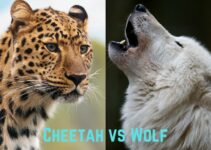Hawks are birds of prey and fearsome predators. Coyotes may be on the smaller end when compared to their wolf brethren, but they are capable and dangerous predators in their own right. These two animals have probably encountered each other during their time in the wild, which should be no surprise.
Given that they are both predators, one has to wonder if one would eat the other. This is particularly true of the hawk who has the advantage of flight. In this article, we are going to answer whether a hawk will eat a coyote if given a chance.
Contents
Do Hawks Eat Coyotes?
We know hawks are carnivores, which means they eat meat. However, this also means that they eat carrion (dead animals) and animals that hunt.
While a coyote is not part of their usual diet, if the opportunity arises and they are hungry, they will go after one. Their usual diet comprises smaller birds, lizards, mice, snakes, rats, and rabbits. However, they will take advantage and eat a coyote if given a chance.
The hawk does have to be large enough though to take down a coyote if it is still alive, so do not expect hawks on the smaller side of the spectrum to take down a coyote.
How do Hawks Attack Coyotes?
The hawk would kill a live coyote the usual way it wants to kill their prey. It spots them from above and then waits for the right time to strike. Often, you will see them soaring above for a while until they swoop down and grab the prey in their talons.
They could also do this from a tree, but there is a common theme. A hawk will almost always swoop down and grab the prey in their talons.
Remember, the hawk has to be a decent size to have any chance of picking up a coyote. A coyote’s weight can range from 30 to 50 pounds, so they are not exactly light.
Are Hawks a Danger to Coyotes?
Mostly, hawks are not a danger to coyotes. They usually coexist in the wild with little to no issues. Now, we know they can eat coyotes should the occasion present itself or if they are hungry. However, it is unlikely for them to do it unless the hunger is really strong, or they see an injured coyote or a dead one.
The coyote just does not have to genuinely worry about a hawk randomly killing them, mostly. They will prowl around the forest and go about their business mostly without becoming part of a hawk’s meal.
Do Hawks Eat Other Carnivores?
A hawk can attack and eat other carnivores like coyotes if the opportunity arises or if the carnivorous animal is already dead. A hawks’ diet usually comprises birds, insects, snakes, mice, rats, rabbits, and other birds. Most of these animals are not strictly carnivores or carnivores. Same with foxes. They have eaten foxes, but foxes are omnivores.
So, while a hawk can eat other carnivores, it is not common and certain conditions have to be met in order for the hawk to even consider eating another carnivore. It is more likely for a hawk to just adhere to its usual diet and hunt one of those animals.

Do Hawks Eat Any Plants/Seeds/etc.?
Hawks are carnivores, so they prefer to eat meat. It is very unlikely that a hawk would eat a plant or any bird seed because it is just not a regular part of their diet. Could you ever walk out one day and see a hawk eating out of your bird feeder? Yes, it could happen, but the chances of it happening are very, very unlikely.
The usual birds that eat at bird seed feeders are chickadees, woodpeckers, doves, cardinals, and blue jays to name a few. A hawk is probably not an animal you are going to see eating out of the bird feeder. They are more likely to eat one of the other birds at the bird feeder since hawks do eat smaller birds as a part of their daily diets if you recall us mentioning before.
Can a Hawk Pick up a Coyote?
A hawk cannot pick up anything that is heavier than their body weight because their wings just are not strong enough to carry the added weight. Recall that a coyote can grow between 30 to 50 pounds, which is many times heavier than even the largest hawk in the wild.
While they might attack a coyote that is injured or eat one that is already dead, it is extremely unlikely they could pick up a coyote. If they even tried, they would probably just end up crashing straight to the ground.
Hawks are pretty smart birds so they probably would not engage in such an action that could cause them becoming seriously injured. It is unlikely they would do such a thing.
Can a Coyote Kill a Hawk?
We know a hawk can kill a coyote if certain conditions are met, but then you have to consider the coyote. Is it possible for them to attack and kill a hawk? Because a hawk can fly out of the way, it is unlikely for a coyote to even catch it. Now, if the hawk is sick, this is a different story.
A sick hawk who cannot fly at all or fly off quickly could be caught by a coyote and then eaten. However, like with hawks killing and eating coyotes, there are certain conditions that need to be met in order for a coyote to kill a hawk. That a hawk can just fly off gives it a very big advantage over a coyote who is, unfortunately, permanently grounded.
Do Coyotes Eat Hawks?
We mentioned above that it is unlikely for a coyote to kill a healthy hawk because they can simply fly off and out from the coyote’s clutches. Because of this, it is unlikely for a coyote to eat a hawk because they can hunt it. If a coyote were to come across an injured hawk or something and then finish the job, they could eat the hawk for a meal. It would probably be a delicious one too, given the size of some hawks.
Still, we emphasize that this is very unlikely to happen, Just because something is possible does not mean there is more than a one percent chance of it occurring. Only if conditions can be met is it even possible for a coyote to eat a hawk for one of its meals.
What Animals are Hawks Afraid of?
While a hawk is a bird of prey and pretty formidable, there are animals that hawks are just straight up afraid of. These animals include:
· Owls, which hawks prefer to stay away from. They can be a lot larger than hawks so it is understandable why they would avoid them.
· Eagles will eat hawks if they run into each other. These birds are huge, so it makes sense why a hawk wants to steer clear of them.
· Crows are not much larger than hawks, but hawks travel alone while crows travel in groups. A murder of crows could easily cause some serious damage to the animal.
· Wolves, though this is unlikely because hawks can fly away. However, if there is an opportunity and the timing is right, a wolf could be a danger to a hawk.
· Other hawks believe it or not. Hawks will attack other hawks—usually because of territory.
What is the Natural Predator of a Hawk?
One of the great things about being a hawk is that they do not have many natural predators. However, just because they do not have a lot of ones does not mean they do not exist. The following are the natural predators of hawks:
· Owls, which is understandable since they fear them.
· Other hawks that are significantly larger than the hawk in question
· Eagles… no explanation is really needed. Look at the size of them.
· Snakes, though they tend to eat eggs, babies, and younger hawks rather than adult hawks because it is easier.
· Raccoons sometimes go after hawk nests to eat eggs.
· Foxes will also sometimes go after hawk nests to eat eggs.
So, in the end, it is a mixed bag. Some are more likely to go after adult hawks while others tend to go after eggs or young hawks.
Final Thoughts
And there you have it all your animal lovers out there. You now know that a hawk can eat a coyote if the circumstances are just right. The same goes for a coyote going after a hawk.
However, if these conditions are not met, it is very unlikely for either of these things to happen. Hawks do have the upper hand… literally. I mean, they can fly. They can’t get a better upper hand than that.







